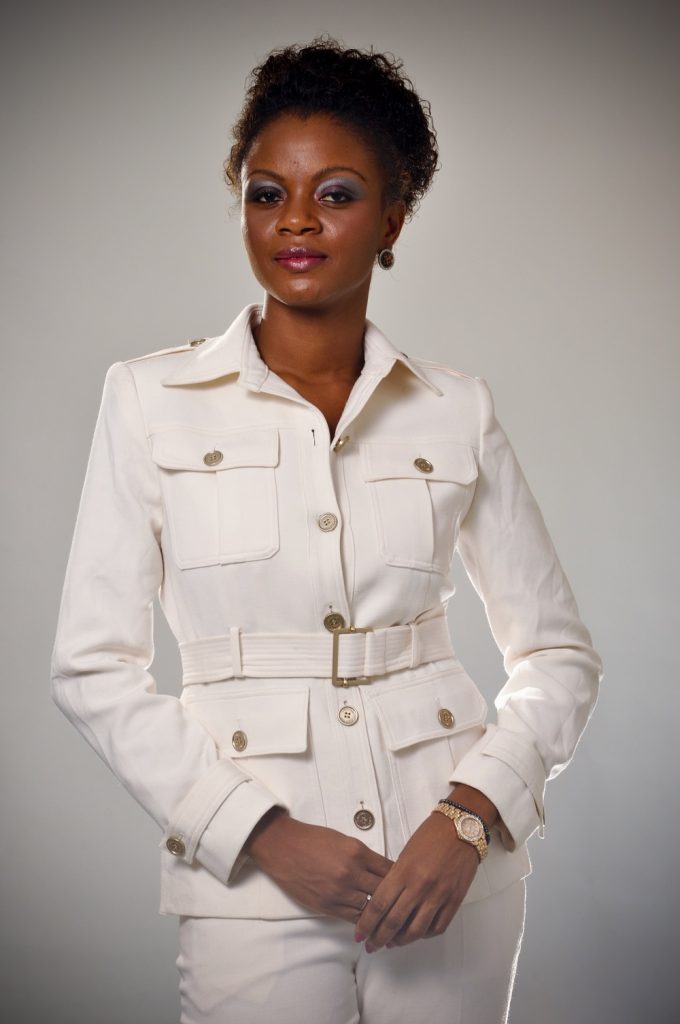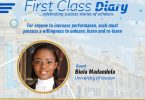I saw this interview of Patrice Juah from Leading Ladies Africa and thought to share it with the Edugist community because it made for a great read and clearly espoused the place of Education in our lives as we pursue our life goals.
The interview below:
When you talk about women who are making a way for other women to be empowered, Patrice Juah will feature right at the top. She is a multi-talented entrepreneur who is passionate about the education of the girl child in Africa, particularly in Liberia. In our interview with her, she lets us into her world and tells us more about the inspiring work that she does.
Who is Patrice Juah and what do you do?
Patrice Juah is a dynamic, driven and multitalented young woman with a passion for service and empowering women and girls through education and entrepreneurship. She is a Poet, Writer, Broadcaster, Communications Strategist, Entrepreneur and a Mandela Washington Fellow for President Obama’s Young African Leaders Initiative (YALI). She’s the founder and Executive Director of Martha Juah Educational Foundation, a nonprofit organization that provides scholarships, mentorship and educational opportunities to girls in rural Liberia. Patrice is the founder and Creative Director of Moie, an ethnic brand that promotes and brands the Liberian fashion industry and the traditional woven fabric, Country Cloth. She’s also the founder of Sexy Like A Book, an academic initiative designed to inspire young women and girls to improve their perspective on reading, literacy and education.

Tell us why you decided to launch the Miss Education Awareness Pageant.
I launched the Miss Education Awareness Pageant in 2007 through the Martha Juah Educational Foundation, to promote and advance girls’ education in Africa, and to inspire girls to pursue higher education. Since its founding, the Miss Education Awareness Pageant has gone on to produce several outstanding young women (Education Ambassadors), who continue to mentor and inspire their peers to continue their education, and are looked up to as role models in their communities. The pageant has also awarded academic scholarships and provided mentorship to all of its participants. It was even acknowledged by First Lady Michelle Obama, a staunch champion of Girls’ Education, as an innovative approach towards keeping girls in school, during her speech at the Young African Leaders Presidential Summit in Washington D.C in 2014.
Has being a former beauty queen had any impact on your success as an entrepreneur?
Yes, it has, particularly with regards to being able to take risks and approach life and every situation with confidence, class and a winning attitude. Being a beauty queen helped me build many great connections, which I continue to leverage throughout my entrepreneurial journey.
A lot of people still believe the African woman’s place is only in the home. What do you think can be done to change this mindset?
I think that kind of belief is outdated and erroneous. African women over the years have proven that our role far exceeds the home. We’ve seen women take the mantle of leadership globally, and in Liberia, in particular, where we elected Africa’s first female president. And although those “glass ceilings” remain, I believe we’re equipped and prepared to go above, around and beyond them in ensuring the Africa we all envisage. Although not widely affirmed, African women have proven themselves to be very effective leaders. When we own and embrace our power and authenticity, we leave the rest of the world with no choice, but to respect and see us as equals.

What challenges have you faced as an entrepreneur and how have you been able to overcome them?
As a Creative entrepreneur, my business, MOIE, has been in operations for 8 years and some of the challenges we’ve faced are: the lack of sustained access to critical markets and resources, largely unskilled workforce, limited business infrastructure and getting customers to engage our business as a business and not only an “art”. This is usually a challenge for most creative businesses, because people think we make a living from “compliments” and “thank yous.” We’ve also been challenged by limited access to funding, and quite recently, the Ebola outbreak, which forced us to close our upscale store temporarily and retool.
I was fortunate to do a Business and Entrepreneurship program at Dartmouth College in the U.S, and the Design Thinking methodology, a component of the program helped me to develop a more structured approach to innovation and problem solving, which has been very helpful for the business moving forward. Also, participating in, and speaking at various industry related conferences and trainings around the world, have helped to enhance my skills and expand my networks. The challenges are many, but they inspire us to constantly innovate and think outside of the box. With our current positioning, I’m confident and can unequivocally say that Moie will impact the Liberian and African creative sectors for years to come.
Take us through a day in the life of Patrice Juah
A day in the life of Patrice Juah is fun, busy, sometimes hectic and above all interesting. My day starts with prayer and meditation to keep me centered and focused. After that, I take a peek at my to-do list for the day, which I usually do the day before. Without a to-do list, I roam about aimlessly, so it’s like my personal GPS. After checking out my to-do list, I have breakfast and go to work. Aside from my entrepreneurial ventures, I work for a nonprofit organization, as a Communications Strategist. So my time is divided between their work and mine.
My books are my best friends and I’m often accompanied by a book or two. I read several pages at lunchtime, if I’m not eating or busy, of course. I get back to work, finish up my tasks for the day and go home. Once home, I freshen up, have dinner and play with my niece and nephew. Later in the night, I read or write to help me de-stress and unwind. I work best during the morning hours when everyone is asleep, that’s when I believe true creativity is birthed. I try to fill my days with positivity and laughter, lest I get stressed and overwhelmed by everything happening around me. I dislike routines, so I keep myself open to fun and creative ways of spending my time.
You are an advocate for girls’ education. How would you say education has helped you get to where you are today?
I was raised by a primary school teacher, my mother, who taught in rural Liberia for 47 years. She inculcated in me discipline and the value and appreciation for education from a very young age. Those values continue to guide me today. Having an older sister, aka my backup mom, who always believed in and supported me, inspired me greatly. I think every girl needs an O.J (my older sister), or a strong female figure in her life. Education has enabled me to dream beyond boundaries and limitations. As a lifelong learner, I’m dedicated to personal development and becoming the best version of myself possible.
Still on education, what do you think can be done to improve the chances of the African girl child having access to good education?
To improve the chances of the African girl having access to good education, we need to eliminate and break barriers such as female genital mutilation, child marriage, teenage pregnancy, the high cost of school etc., which continue to pose threats to, and prevent girls from accessing and completing primary and secondary school. For Africa to succeed, Africans must make education a powerful driver and the strongest instrument in the reduction of poverty, improving health, gender equality, peace and stability
What do you consider to be your greatest achievement so far?
Of the myriad of achievements I’ve had, I consider the contributions I have made towards Girls’ Education in Africa as my greatest and most meaningful achievement so far. In acknowledgement of my work in advancing girls education through the Martha Juah Educational Foundation, I was invited by U.S First Lady, Michelle Obama, for a roundtable discussion on Girls’ Education in Africa, held in Washington D.C in 2014. There I made recommendations on ways to advance girls’ education on the African continent and highlighted some of the roadblocks to girls’ education. That was a defining moment in my life. The insights shared contributed immensely to the launch of the Let Girls Learn Initiative, a White House initiative to ensure adolescent girls around the world get the education they deserve. I believe that the discussion further motivated First Lady Michelle Obama’s visit to Liberia, during her Let Girls Learn tour earlier this year.

What motivates you to keep on going when things get rough?
My faith in God, my passion for what I do, the love of my country and community, and of course the feedback I receive daily on the positive impact we’re making on the lives of young girls and women.
If you become the President of Liberia today, what three things would you do or change?
If I become president of Liberia today, I’d tackle Energy, Health and Agriculture, because they form the building blocks for a strong economy.
Do you have any plans to take up a political role in your country?
I believe that I have a lifelong calling to public service, so it’s something that will happen in a seamless and effortless manner, without my having to force anything. When God validates, He elevates, we only have to wait on His timing and approval.
You are a woman of many talents – writing, broadcasting, fashion and speaking. How have you been able to balance all these gracefully?
As a gem of unimaginable proportions, I’ve been blessed with many gifts, which I cherish greatly. Living with them, however, wasn’t always easy. Being multitalented is still somehow frowned upon. You know in Africa, you’re expected to be one thing or the other. So along my journey, although admired, I was often misunderstood by many who found it difficult to understand and accept my multifaceted nature. But with time, the commitment to honing my craft and discovering my purpose, have proven worthwhile. The puzzle pieces are finally falling beautifully into place. Doing what you love, staying convicted in what you believe, working hard and being true to yourself, always pay off in the end.
What inspired you to become a strong voice for women empowerment?
Growing up during Liberia’s 14 years of war, my family and I faced many hardships and dangers, but despite those exposures as a child, I grew up into a young woman focused and determined to make a difference. During those war years, I saw and experienced firsthand, how women and girls were subjected to violence, abuse and exploitation. Although we’ve had 12 years of peace in Liberia and are making progress in the women’s empowerment space, those challenges remain prevalent today. This strengthened my resolve to add my voice and take action. When we address the concerns of the marginalized, we speak not only on their behalf, but on our own behalf, and serve as an even greater voice for many others, whose voices often go unheard or are buried 6 feet under.
If you could have the opportunity to work with three African women, who will they be?
If I had the opportunity to work with three African women I’d work with Dr. Precious Moloi-Motsepe of South Africa, Angelique Kidjo of Benin and Khanyi Dhlomo of South Africa. There are many other exceptional women on the continent who’re doing incredible work, but those are my top picks 3 for now.
You were recently the keynote speaker at the Global Entrepreneurship Week in Geneva, Switzerland. How was the experience?
It was an incredible experience. I was invited as a guest of the U.S government to speak and share insights on “How we can make entrepreneurship more sustainable for the long-term, particularly for businesses that employ or engage diaspora communities.” It was incredibly insightful hearing the perspectives of various panelists from diverse backgrounds, and discovering those common threads that bind us all. I left there inspired, enlightened and equipped to move my business forward.
[one_fourth last=”no”][/one_fourth]
The Leading Ladies Africa Series is a weekly interview series that focuses on women of African descent, showcases their experiences across all socio-economic sectors, highlights their personal and professional achievements and offers useful advice on how to make life more satisfying for women.
It is an off-shoot of Leading Ladies Africa, a non-profit that promotes women empowerment and gender inclusion for women of African descent.








